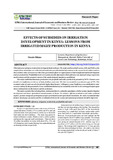| dc.contributor.author | Otieno, Dennis | |
| dc.date.accessioned | 2021-07-06T12:08:42Z | |
| dc.date.available | 2021-07-06T12:08:42Z | |
| dc.date.issued | 2020-07 | |
| dc.identifier.citation | EPRA International Journal ofEconomic and Business Review-Peer Reviewed Journal, Volume - 8, Issue -7, July 2020 | en_US |
| dc.identifier.issn | 2347 - 9671 | |
| dc.identifier.uri | https://www.researchgate.net/publication/343355987_EFFECTS_OF_SUBSIDIES_ON_IRRIGATION_DEVELOPMENT_IN_KENYA_LESSONS_FROM_IRRIGATED_MAIZE_PRODUCTION_IN_KENYA | |
| dc.identifier.uri | http://hdl.handle.net/123456789/4708 | |
| dc.description.abstract | This study assessed maize productivity in irrigated fields in Kenya. The study used household surveys, KIIs and FGDs as the samples from which data was collected and analyzed to provide detailed information on the current local realities and use the economic value of resources to show how government efforts to support farmers lead to inefficient market development and low productivity. Profitability levels were analyzed at the data means while efficiency was analyzed using a regression model outputs and the geometric means of the supply-demand equation at equilibrium The study established that maize production was profitable and with a productivity potential of 163%. Framers were found to be inefficiency in the use of land, fertilizer, and water. The later accounted for a production gap of 71%. The economic value of water was also found to be higher than farmers’ willingness to pay. Inefficiency was attributed to water resource subsidy by the government. It was established that lack of accountability arose due to the existing principal-agent theory relation between the farmers and the politicians. The study concludes that subsidy policies, institutional factors, and policy paradigms or belief systems impede irrigation development and hence agricultural transformation in Kenya. To enhance efficient production and reduce political neglect, promote invigorate participatory project prioritization and agricultural investment, the study recommends that farmers should pay a just price and the coordination between the county and national government should be improved. | en_US |
| dc.language.iso | en | en_US |
| dc.subject | Efficiency, irrigation, productivity, profitability and water | en_US |
| dc.title | Effects of Subsidies on Irrigation Development in Kenya: Lessons from Irrigated Maize Production in Kenya | en_US |
| dc.type | Article | en_US |

